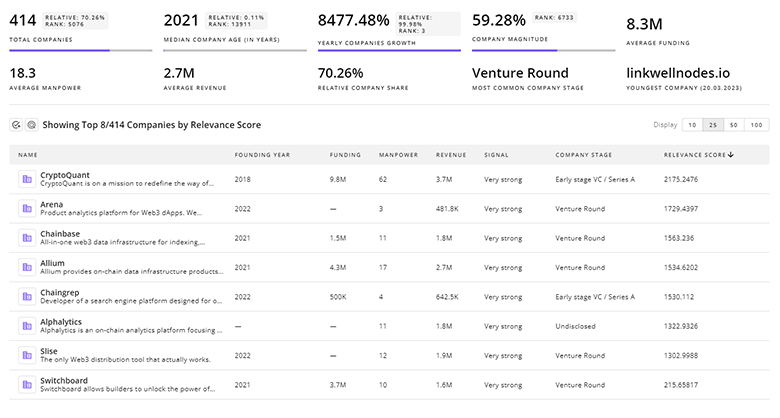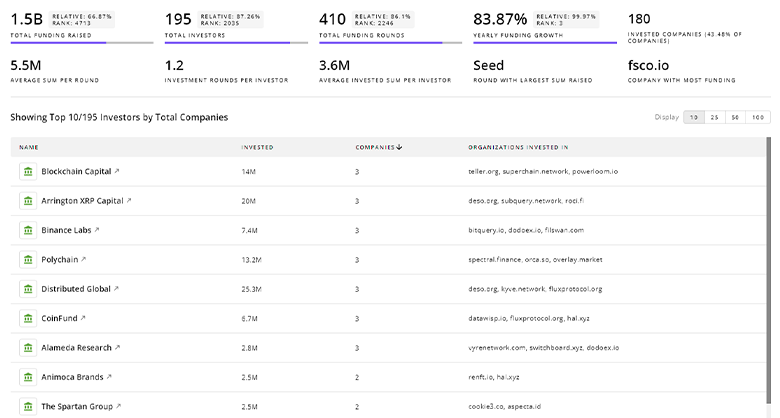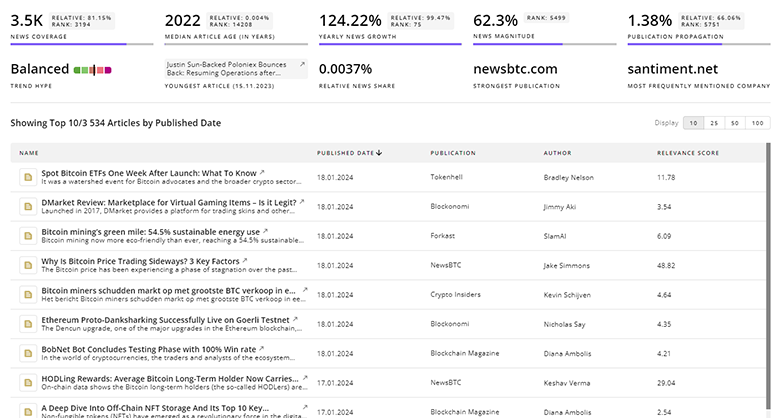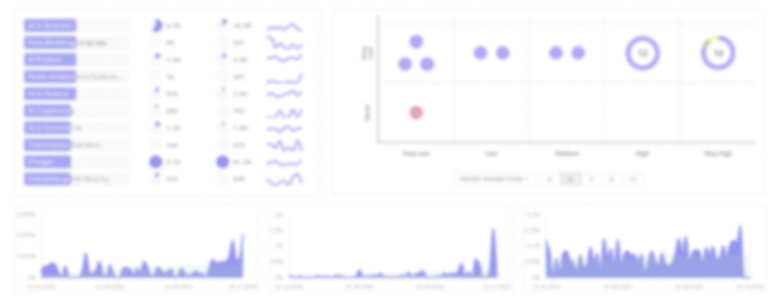
Data Science Report
: Analysis on the Market, Trends, and TechnologiesThe data science sector is scaling rapidly: the internal topic profile records 147,903 articles on data science and projects strong topic growth potential, while market forecasts place the platform market in the low-hundreds of billions by the end of the decade, reflecting sustained commercial demand for analytics, model operations, and data infrastructure. This report synthesizes patent activity, market forecasts, and industry signals to show three practical implications: (1) platform consolidation and cloud-hardware partnerships will define who delivers production AI at scale, (2) product teams must prioritize data quality, governance, and MLOps to shorten time-to-value, and (3) no-code/low-code and tabular foundation models will expand the pool of users able to generate predictive outcomes while shifting vendor differentiation toward verticalized solutions.
We updated this report 92 days ago. Noticed something’s off? Let’s make it right together — reach out!
Topic Dominance Index of Data Science
The Topic Dominance Index trendline combines the share of voice distributions of Data Science from 3 data sources: published articles, founded companies, and global search
Key Activities and Applications
- Building and operating data platforms (data lakes, lakehouses, warehouses) that feed analytics and ML products; cloud migration drives this work and determines scalability and cost structure.
- Data engineering and pipeline automation (ETL/ELT, DataOps) to enable reliable, repeatable inputs for models and dashboards; automation reduces "spaghetti" ETL risk and shortens delivery cycles.
- Predictive analytics and decision systems for finance, healthcare, manufacturing, retail and logistics where forecasting and optimization directly alter revenue, risk, and costs.
- Model operationalization (MLOps) including CI/CD, monitoring, data and model versioning, and rollback to maintain production trust and regulatory readiness.
- Data quality, observability and governance (lineage, privacy-preserving training, audit trails) required by regulated verticals and by enterprises adopting LLMs and generative components.
Emergent Trends and Core Insights
- Platform market expansion with divergent forecasts: some sources show very aggressive scale expectations for data-science platforms (multi-hundred-billion totals by 2030), indicating both vendor opportunity and consolidation pressure for integrated offerings Research and Markets (market report) Fortune Business Insights Grand View Research.
- Democratization: no-code and low-code tooling, plus tabular foundation models, reduce technical barriers and shift vendor competition toward embedding domain templates and governance into those tools.
- Data-centric engineering: patents and company activity prioritize data curation, versioning and augmentation (synthetic data, data selection) as a core lever to improve model performance and lower training cost.
- MLOps + observability become table-stakes: investors and buyers favor platforms that combine labeling, quality checks, drift detection, and reproducible pipelines to reduce production risk AI Business.
- Vertical specialization: healthcare, finance, and manufacturing continue to generate the most immediate ROI from applied data science; solutions that embed regulatory controls and clinical/financial domain models win enterprise procurement decisions healthcare analytics market forecast.
Technologies and Methodologies
- Machine learning, deep learning, AutoML and tabular foundation models for supervised and structured-data problems; patents emphasize ensemble learning and AutoML flows for production pipelines.
- GPU-accelerated training and cloud-hardware stacks driven by cloud-vendor and hardware partnerships to handle large-model performance needs Microsoft-NVIDIA strategic trend (web news).
- DataOps and MLOps practices for pipeline automation, CI/CD for models, and monitoring frameworks to detect drift and to provide auditability.
- Federated learning, differential privacy, and synthetic data for privacy-preserving model training in regulated domains.
- Real-time streaming architectures and lakehouse patterns (Spark, Kafka, Iceberg) for immediate inference and operational analytics.
Data Science Funding
A total of 17.3K Data Science companies have received funding.
Overall, Data Science companies have raised $917.5B.
Companies within the Data Science domain have secured capital from 67.3K funding rounds.
The chart shows the funding trendline of Data Science companies over the last 5 years
Data Science Companies
- DatologyAI — DatologyAI focuses on automated data selection and curation for training large models, offering modality-agnostic algorithms that reduce noisy training examples and lower compute cost for deep learning workflows. Their product directly targets the data-centric engineering trend and helps enterprises improve model accuracy with less retraining effort, making them relevant to teams prioritizing dataset quality ahead of model tuning.
- Sciobyte — Sciobyte positions itself as a data-tech specialist that builds outcome-driven data products and structured experimentation frameworks; it emphasizes reproducible pipelines and engineering practices that convert analytics prototypes into production services. Sciobyte's approach aligns with enterprise needs for MLOps and DataOps to reduce operational risk when moving models from research to production.
- Dataspin Labs — Dataspin Labs develops AI-powered data augmentation and automation tools that accelerate data labeling and quality checks; they target teams that need faster dataset preparation for supervised learning and computer vision projects. Their tooling maps to high investor interest in infrastructure that shortens time-to-model and reduces manual labeling costs.
- Rubiscape — Rubiscape delivers applied analytics and received a national AI innovation award; they combine domain consulting with platform integrations to deliver healthcare and manufacturing solutions that include prediction and optimization modules. Their profile exemplifies the vertical specialization approach that enterprise buyers prefer when domain compliance or domain expertise matters.
- Zerve — Zerve offers a zero-code project-management and data-science orchestration platform and raised $7.6M to scale product-market fit; they address non-technical user adoption by embedding governance and deployment controls into no-code workflows, fitting the democratization trend while keeping enterprise governance in scope.
Gain a better understanding of 119.4K companies that drive Data Science, how mature and well-funded these companies are.

119.4K Data Science Companies
Discover Data Science Companies, their Funding, Manpower, Revenues, Stages, and much more
Data Science Investors
Gain insights into 44.4K Data Science investors and investment deals. TrendFeedr’s investors tool presents an overview of investment trends and activities, helping create better investment strategies and partnerships.

44.4K Data Science Investors
Discover Data Science Investors, Funding Rounds, Invested Amounts, and Funding Growth
Data Science News
Gain a competitive advantage with access to 149.9K Data Science articles with TrendFeedr's News feature. The tool offers an extensive database of articles covering recent trends and past events in Data Science. This enables innovators and market leaders to make well-informed fact-based decisions.

149.9K Data Science News Articles
Discover Latest Data Science Articles, News Magnitude, Publication Propagation, Yearly Growth, and Strongest Publications
Executive Summary
The data science landscape now demands pragmatic product strategies: build predictable, auditable pipelines; invest in dataset engineering and observability; and choose either integrated platform play or specialization into vertical workflows where domain controls and regulatory readiness justify premium pricing. Market signals point to large addressable demand, but vendors that fail to embed governance, reproducibility, and simple user experiences into their offerings risk losing enterprise customers to better-integrated stacks. Teams that align architecture, tooling, and organizational processes around data quality and MLOps will convert analytic experiments into reliable business outcomes.
We seek partnerships with industry experts to deliver actionable insights into trends and tech. Interested? Let us know!











